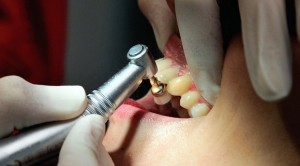Dental amalgams safe, UP dentistry school

A dentist uses a drill as she treats a patient on September 6, 2013, in Bailleul, northern France. AFP FILE PHOTO/PHILIPPE HUGUEN
MANILA, Philippines—No scientific evidence links the use of mercury-containing dental amalgams or fillings with any health condition in spite of findings of high levels of mercury vapor in dental institutions and supply stores nationwide, the dean of the University of the Philippines College of Dentistry in Manila said.
Dr. Vicente Medina, in a letter to the Inquirer reacting to a study released last week by the pollution watchdog BAN Toxics, branded the group’s statements as “scare tactics” with no basis in science.
He cited a number of scientific literature on the safety of dental amalgam or “silver pasta,” including the findings of a study done by the United States Public Health Service and the US Food and Drug Administration in 1993.
“Current scientific evidence does not show that exposure to mercury from amalgam restorations poses a serious health risk in humans, except for an exceedingly small number of allergic reactions,” according to that study.
Medina said the UP College of Dentistry was “strongly opposed” to proposals to ban the use of dental amalgam in the Philippines because of the lack of scientific evidence about any adverse health effect resulting from it, and expensive alternatives.
“Mercury-free alternatives are now widely available but they are not as cost effective as amalgam,” he said.
The alternative to dental amalgam is a composite filling material that is “two-times more expensive, is technique-sensitive and is indicated for patients with small- to moderate-size cavities and with good oral hygiene (low caries risk),” Medina said.
Dental caries refers to the cause of tooth decay, which afflicts 90 percent of the world’s population.
“Majority of Filipinos are high caries risk patients and have moderate- to large size cavities which are better restored with dental amalgam. Dental amalgams are economical, not technique-sensitive, strong and last longer,” he added.
BAN Toxics (BT) on Thursday released the results of its study titled “What is in the Air: Mercury Vapor Levels in Dental Institutions,” which discovered high levels of mercury vapor in the five dental institutions and three supply stores it examined.
In a news release, BT said its study found that mercury vapor in dental institutions exceeded standard reference levels set by the US Environmental Protection Agency, “endangering the health and well-being of dental students, dental workers, and patients, among others.”
The study covered five dental schools, including three in Metro Manila, and one each in the Cordillera Administrative Region, Region 7 and 11, and three dental supply stores in Metro Manila, its lead researcher Myline Macabuhay said.
The names of the participants were not revealed due to nondisclosure agreements, but Macabuhay said she believed the findings were representative of dental institutions in the country.
Dental amalgam is used as restorative material for tooth cavities. It is an alloy of mercury (50 percent), silver (22-32 percent), tin (14 percent), copper (8 percent) and other trace materials, according to BT.
BT’s news release quoted Dr. Lillian Lasaten-Ebuen, president of International Association of Oral and Medical Toxicologists-Philippines, as saying her group welcomed the planned phaseout of dental amalgam by the Department of Health.
But Medina clarified that the DOH had not actually issued any department order phasing out dental amalgam in the Philippines.
He said the DOH could not order a phaseout as the Philippines was a signatory to the 2014 United Nations Environment Program Minamata Convention on Mercury, which arrived at a consensus only to reduce or “phase down” the use of dental amalgam.
“A phase-down is different from a phase-out. The statement of Dr. Ebuen is clearly an attempt at legitimizing her unsubstantiated claims at the expense of the DOH,” he said.














